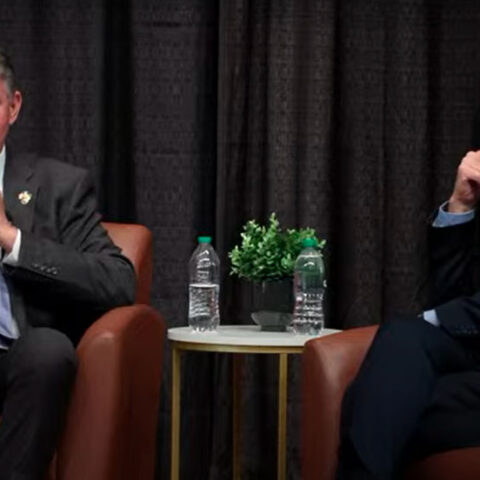Question: On what issue (domestic or foreign) do you think a polarized Congress can actually agree? What policy progress do you think could be made on this issue?

By: Caley Trujillo
Webster’s dictionary defines polarization as the “concentration about opposing extremes of groups or interests formerly ranged on a continuum.” Everyday we hear political commentators and journalists speak of the “deeply polarized” United States Congress and how the two main parties disagree on everything. What does all of this polarization jargon actually mean for our nation? From healthcare, to gun rights, taxes, and more, the modern Democratic and Republican Parties could not seem more ideologically different. According to a March 2013 Gallup poll only thirteen percent of Americans approve of Congress, which is almost unchanged from the fifteen percent approval rating, they received in February. Many Americans are frustrated with Congress, yet are almost just as polarized themselves, unwilling to budge on their policy positions either.
Whether polarization stems from regional, racial, or social differences it has become a front page topic for years and it seems that there is no end in sight. However, there is one policy issue I believe Congress, and American voters, can agree on in the future and has been agreed on in the past. National security is the one policy that most members of Congress can come to terms with one another on. By looking back through history and analyzing future national security threats, there is hope that Congress can actually compromise on something and move the country forward.
Although Congress seems more polarized than ever, the parties have been very polarized at other points throughout our history. Both houses were polarized in the decades after the Civil War and Reconstruction. Throughout the first and second World Wars party polarization decreased then steadily increased since the 1950’s into the polarization we have today. However there are glimmers of hope that Congress can compromise when we look at the voting record when it comes to national security legislation. War and defense is not a glamorous or peaceful topic to compromise on but is one that holds true in American tradition.
The United States Congress derives its war voting power from Article One Section Eight of the Constitution. Throughout America’s military history, Congress has voted unanimously for war or military engagements. On December 7th, 1917 the United States Senate voted unanimously 74 to 0 and the House 365 to 1 for a declaration of war against Austria-Hungary during World War One. Congress declared war on Japan, Germany, Italy, Bulgaria, Hungary, and Romania throughout 1941 and 1942. Both the Senate and House voted unanimously for war against these nations except for one House vote against the declaration of war against Japan. In 2001, three days after the September 11th terrorist attacks, the Senate voted unanimously for a military engagement in Afghanistan, named Operation Enduring Freedom. The House had close to a unanimous vote except for Representative Barbara Lee’s “nay” vote. Many other wars, such as the Mexican-American and Vietnam War, had close to unanimous consent as well. Throughout our nation’s history national security seems to be one policy issue that Republicans and Democrats in Congress can vote together on. When it comes to the protection of our nation’s way of life the legislative branch does not quarrel with one another but instead takes prompt action to reprimand those who aim to harm us.
Within the near future the highly polarized Congress may be tested once again on their ability to compromise with one another on matters of national security. North Korean leader Kim Jong Un has raised serious concerns with his antics the past few months. Since December 2012, North Korea has, “put a satellite in orbit atop a long-range rocket; conducted a nuclear bomb test, its third since 2006; and claimed to be prepared for pre-emptive nuclear attacks on the United States.” During March 2013, North Korea declared an end to its 1953 Armistice with South Korea. The United States has maintained an alliance with South Korea and continues to request sanctions against North Korea’s belligerent threats. In early April, Senator Lindsay Graham went on NBC’s “Meet The Press” to express his concerns over North Korea, “I could see a major war happening if the North Koreans overplay their hand this time, because the public in South Korea, the United States, and I think the whole region, is fed up with this guy.” It appears that the polarization games are already being put aside when it comes to North Korea. On February 15th, the U.S. House of Representatives passed, by a vote of 412 to 2, a bipartisan resolution condemning North Korea for nuclear test, repeated violations of multiple United Nations Security Council resolutions, and for its repeated provocations that threaten international peace and stability. As violent rhetoric continues from North Korea Congress appears to be progressing as a cohesive group against the communist countries’ illegal actions.
Throughout history the United States Congress holds a reputation of party polarization, continuous gridlock, and unwillingness to compromise across party lines. The current youth generation has endured some of the worst party polarization ever in American history. With all the healthcare, gun, and gay marriage debates many would probably believe that Congress has never agreed on anything. However, if one were to look at Congressional voting records dealing with national security issues they would realize that this branch can come to a consensus on one topic. Congress has voted as a cohesive bloc for declarations of war and military engagements throughout our nation’s history. National security should serve as a lesson to all members of Congress that sometimes it is a noble value to compromise with one another.
Question: On what issue (domestic or foreign) do you think a polarized Congress can actually agree? What policy progress do you think could be made on this issue?
By: Eli Watkins
America’s reliance on dangerously oversized and inefficient banks brought the global economy to the brink of collapse. The wreckage of this disaster is everywhere. Unemployment is stubbornly high. The labor force continues to shrink. Shuttered businesses and empty neighborhoods remain a major part of our landscape. We are slowly climbing back, but the pillars of this colossal crisis still stand.
Our government’s immediate reaction to the crisis was to double down on these banks. We bailed them out and did practically nothing to prevent them from starting another crisis. The size of these institutions, and our reliance on them, has only increased in the wake of the disaster. Our economy relies on these banks so much, that no matter how bad their business practices are, we will bail them out and–even when they commit crimes–we will not prosecute them. They are “Too Big To Fail.”
This means that we are excusing, and ultimately encouraging, bad business practices. The largest investment banks know that if they all play a risky game and lose, then our government will rescue them. It is what led up to the recession. Take Bear Stearns, former investment bank and current notch in Jamie Dimon’s belt, for example. They made terrible investments and got emergency loans when those investments failed. JP Morgan Chase later bought Bear Stearns at a remarkably low price. We did not actually stop anything bad from happening. We only made a big bank bigger. This emboldened the larger investment banks, most of which went on to fail later that year and get rescued by the government. Most of these banks still stand, bigger and more successful than ever.
This is the United States of America. We are supposed to be kind of good at financier capitalism, really the undisputed champions. How dumb would it be if this tragedy happened again, the exact same way, for the exact same reason? We would be like a nation of Olympic swimmers who drowned to death.
Thus far, the powers that be have not shown any serious inclination towards stopping Too Big To Fail. But here is the good news: both parties might actually agree that we should rein these banks in. Just a few weeks ago, a symbolic amendment ending subsidies for Too Big To Fail banks passed unanimously in the Senate. A group of people that agree on little more than the day of the week all agreed with the sentiment that these banks are dangerous.
Senator David Vitter, a conservative Republican, and Senator Sherrod Brown, a liberal Democrat, joined to offer this amendment. They are currently working on a bill that purports to end subsidies and increase capital requirements for Too Big To Fail banks. The two senators can work together even though they do not share the same ideology or party, because this issue is not ideological or partisan. This is about the basic health and stability of our economy.
We can all agree on this. Republicans might want to strike at crony capitalism and reduce the deficit. Democrats might want to protect the people from banks large enough to hold the economy hostage. Both sides might want competing players instead of giant institutions aided by subsidies and treatment so preferential it reeks of corruption.
This does not have to boil down to party labels. Americans overwhelmingly support ending Too Big To Fail. Average members of both parties support it. Economists, academics, and pundits from all along the political spectrum have made the case time and time again for limiting these banks. Experts from widely divergent camps, from Chairman of the Federal Reserve Ben Bernanke to Milton Friedman’s coauthor Anna Swartz, have stressed the danger Too Big To Fail poses. We should listen to them.
Now all of this is encouraging, but it must translate into something substantial. Vitter-Brown is a nod in the right direction. Increasing the capital requirements for the largest banks could give a competitive edge to smaller institutions and at the very least make banking more secure. But, if our politicians are serious about curbing Too Big To Fail, then we need to return to the spirit of Glass-Steagall. This key set of provisions passed in the midst of the Great Depression separated commercial and investment banking. In 1999, both parties came together to repeal Glass-Steagall, and the biggest banks have grown alarmingly ever since. The same entities that engage in commercial banking made, and continue to make, dangerous investments. So when a risky investment threatens to make the bank go under, everyone’s money is in danger. When a bank is big enough, its death reverberates throughout the entire global economy. We need to mandate the separation of commercial banks, investment banks, and insurance companies so no economic player is big enough to bring us all down with it.
Our government needs to revisit banking regulations. I am cautiously optimistic this might happen. Democrats and Republicans deregulated the banks, bailed them out, and sanctioned them Too Big To Fail. But for the first time in a while, both parties might actually work together to do something good for this country. They might work together to undo the poisonous policies that led to the recession and Too Big To Fail. The evidence is there, the sentiment is there, and the will of the American people is there. I hope all of that can make politicians come together to rein in these dangerous financial machines.

